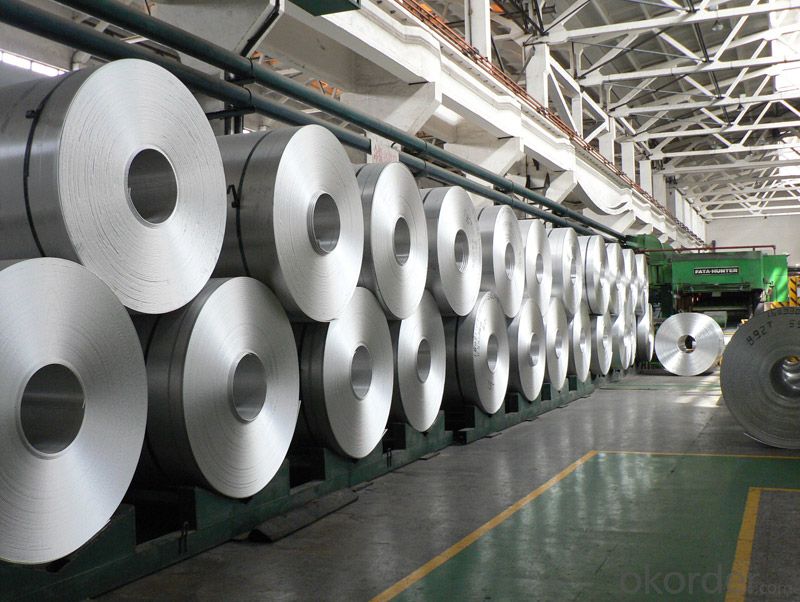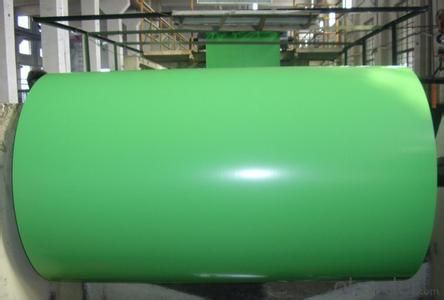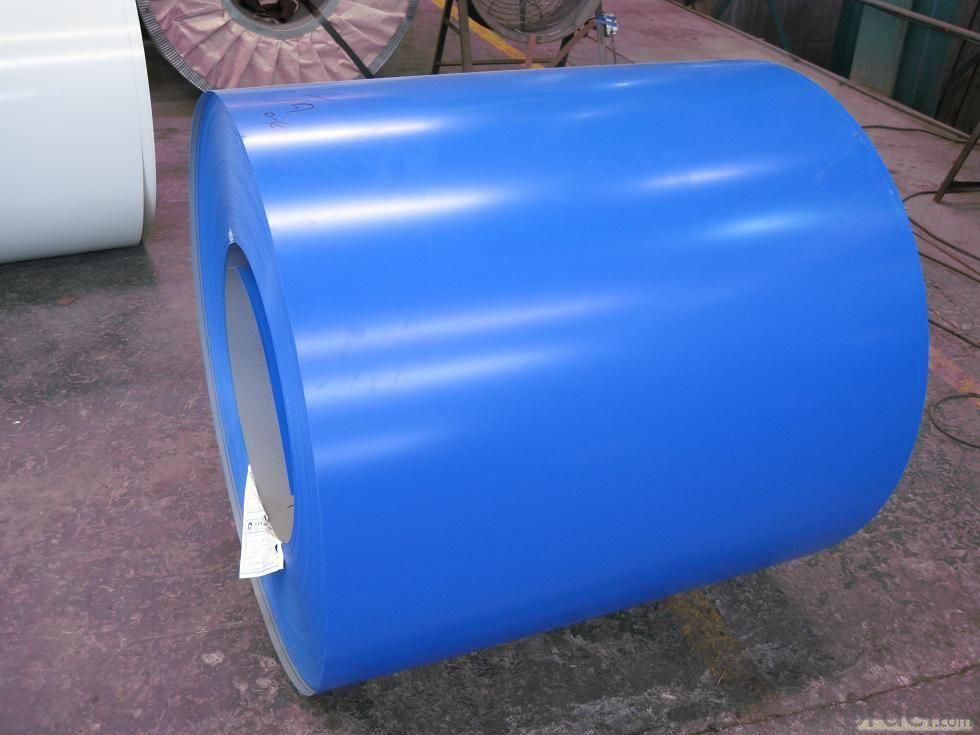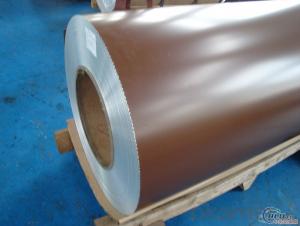Aluminum Coil for Color Coating Window Panel
- Loading Port:
- Shanghai
- Payment Terms:
- TT OR LC
- Min Order Qty:
- 5 m.t.
- Supply Capability:
- 1000000 m.t./month
OKorder Service Pledge
OKorder Financial Service
You Might Also Like
Item specifice
1.Structure of Aluminum Coil for Color Coating Window Panel
Aluminum Coil for Color Coating Window Panel is one semi-finished aluminium material. This strip can be rolled down to aluminium coil,sheet,circle ect. The alloy AA1050 is widly used in building, industry ect. Its weight is much lower than steel. So many customers choosed aluminium material instead of steel.
2. Main features of Aluminum Coil for Color Coating Window Panel
a.Competitive price---We have our own mills and can produce mill finished aluminium coils, so we can control the production cost better.
b.Professional after-sale service---We have more than 15 years exportation experience and you need not worry about the exporation problems.
c.Fast delivery time---We can control the delivery time within 35 days.
3. Image of Aluminum Coil for Color Coating Window Panel



4. Product Specification
| ALLOY | TEMPER | THICKNESS | WIDTH | WEIGHT |
| AA1050 | H18 | 0.2MM-3MM | 1200MM-1500MM | 2 TONS |
5.FAQ:
What is the quality standard?
---Usually our standard is GB3880-2006
What is the largest width?
---It is 2300mm
What is the MOQ?
---Usually we can accept 80 tons.
- Q:What are the different coil coating options for aluminum coils?
- There are several coil coating options available for aluminum coils, including polyester, polyurethane, fluoropolymer, and plastisol coatings. Each option offers unique benefits, such as durability, weather resistance, and aesthetics, allowing for customization based on specific requirements or desired appearance.
- Q:Can aluminum coils be customized to specific requirements?
- Yes, aluminum coils can be customized to specific requirements. The customization process involves adjusting the dimensions, thickness, alloy composition, and surface finish of the coils to meet the specific needs of different industries and applications.
- Q:It's time for a new bike and I don't know enough about the pros and cons of aluminum vs. carbon fiber. I can get a low-end carbon bike or a high-end aluminum for about the same price, so the budget is not really a major issue. Any opinions would be appreciated.
- Just a little personal story here. I recently bought a new old stock Carbon Giant TCR Limited at a great price, did some wheel upgrades and the like then took it out for a ride. The difference between that bike and my Colnago Aluminum Dream (still have it) was amazing. The whole ride quality, smoothness and climbing ability of the CF bike was supierior to that of the Colnago. Or was it just the novelty of the newness? Sure the two have different geometries and gearing but I feel so much more comfortable on the CF giant for long (over 50 mile) rides then the Al. Colnago. Test ride them both, you'll see.
- Q:What are the common surface cleaning methods for aluminum coils?
- There exist various effective surface cleaning techniques for aluminum coils, which can eradicate dirt, debris, and other impurities. Among the most frequently employed methods is pressure washing. This involves utilizing a high-pressure water spray to dislodge and eliminate any dirt or grime from the coil's surface. Pressure washing can be conducted using specialized equipment or simply a regular garden hose with a spray nozzle attachment. Chemical cleaning serves as another popular approach for cleansing aluminum coils. This method entails utilizing specific cleaning agents or solvents, specially formulated to break down and eradicate dirt and impurities from the coils' surface. These chemicals are typically applied using a spray bottle or a pump sprayer and then rinsed off with water after a designated period. Steam cleaning represents another effective technique for cleaning aluminum coils. This involves employing high-temperature steam to loosen and eliminate dirt and grime from the coil's surface. Steam cleaning is often used in conjunction with a cleaning agent or solvent to enhance its efficacy. In addition to these methods, there are specialized tools available, such as coil cleaning brushes or fin combs, which can be utilized to physically remove any debris or build-up from the coil surfaces. These tools prove particularly useful for eliminating smaller particles or debris that may be trapped in between the fins of the coils. It is essential to note that when cleaning aluminum coils, it is crucial to adhere to the manufacturer's recommendations and guidelines to ensure the cleaning process is conducted safely and effectively. Additionally, regular cleaning and maintenance of aluminum coils can promote their longevity and preserve their efficiency.
- Q:Can aluminum coils be used in the production of aluminum sandwich panels?
- Yes, aluminum coils can be used in the production of aluminum sandwich panels. Aluminum coils are typically used as the outer skins or facings of the sandwich panels. These coils are first processed and coated to enhance their durability, corrosion resistance, and aesthetic appeal. They are then bonded with a core material, such as polyethylene or mineral wool, to create a lightweight and rigid sandwich panel structure. The aluminum coils provide the panels with excellent mechanical properties, such as high strength-to-weight ratio, good flexibility, and thermal conductivity. Additionally, the use of aluminum coils in the production of sandwich panels allows for easy customization, as they can be formed, shaped, and painted according to the desired design and specifications.
- Q:How are aluminum coils protected against damage during handling?
- Various methods and precautions are employed to protect aluminum coils from damage during handling. To begin with, the coils are typically enveloped in a protective layer, such as plastic or paper, which serves as a barrier against physical contact and scratches. This wrapping also serves to prevent direct contact with moisture or dirt. Furthermore, aluminum coils are frequently affixed to pallets or housed within crates to provide additional protection during transportation. These pallets or crates serve as a buffer, absorbing any shocks or impacts that may occur during handling or shipping. This effectively reduces the risk of dents, bends, or other types of damage that could compromise the coils' integrity. Moreover, proper handling techniques are employed to ensure the coils are not mishandled or dropped. Forklifts or cranes are commonly utilized to lift and move the coils, thereby minimizing the possibility of human error or accidental damage resulting from manual handling. In conclusion, a combination of protective wrapping, secure packaging, and careful handling practices are implemented to safeguard aluminum coils against potential damage throughout their transportation and handling procedures.
- Q:What are the potential applications of color-coated aluminum coils?
- Color-coated aluminum coils have a wide range of potential applications due to their durability, versatility, and aesthetic appeal. They can be used in the construction industry for roofing, cladding, and facades, providing protection against weather elements and enhancing the visual appeal of buildings. Additionally, these coils can be employed in the manufacturing of transportation vehicles, such as cars, buses, and trains, adding a vibrant and durable finish to their exterior. Moreover, color-coated aluminum coils find application in the production of signage, advertising boards, and interior decoration, offering endless design possibilities.
- Q:What are the standard tolerance levels for aluminum coils?
- Depending on the industry and application, the tolerance levels for aluminum coils can differ from the standard. Generally, these tolerance levels are established by industry standards and specifications like ASTM or ISO. For thickness, the tolerance levels for aluminum coils can range from +/- 0.002 inches to +/- 0.020 inches, depending on the aluminum's specific grade and thickness. Similarly, the tolerance levels for width can vary from +/- 0.010 inches to +/- 0.250 inches. Regarding flatness, the standard tolerance levels for aluminum coils specify the maximum deviation from a flat plane. This can range from 0.001 inches to 0.020 inches, depending on the application's specific requirements. Other factors that can affect tolerance levels include the aluminum coils' surface finish, edge condition, and mechanical properties. To determine the appropriate tolerance levels for aluminum coils, it is important to consult relevant industry standards, specifications, and the specific requirements of the application.
- Q:Can aluminum coils be used in solar panel installations?
- Yes, aluminum coils can be used in solar panel installations. Aluminum is a popular material choice due to its lightweight, corrosion resistance, and excellent thermal conductivity. It is commonly used for manufacturing solar panel frames and mounting systems, providing durability and cost-effectiveness in solar installations.
- Q:What are the different color coating options for aluminum coils?
- The different color coating options for aluminum coils include standard solid colors, metallic colors, and special effect finishes such as textured or pearlescent coatings. These coatings can be applied using various methods like powder coating, liquid coating, or anodizing to achieve the desired color and aesthetic appeal.
1. Manufacturer Overview |
|
|---|---|
| Location | |
| Year Established | |
| Annual Output Value | |
| Main Markets | |
| Company Certifications | |
2. Manufacturer Certificates |
|
|---|---|
| a) Certification Name | |
| Range | |
| Reference | |
| Validity Period | |
3. Manufacturer Capability |
|
|---|---|
| a)Trade Capacity | |
| Nearest Port | |
| Export Percentage | |
| No.of Employees in Trade Department | |
| Language Spoken: | |
| b)Factory Information | |
| Factory Size: | |
| No. of Production Lines | |
| Contract Manufacturing | |
| Product Price Range | |
Send your message to us
Aluminum Coil for Color Coating Window Panel
- Loading Port:
- Shanghai
- Payment Terms:
- TT OR LC
- Min Order Qty:
- 5 m.t.
- Supply Capability:
- 1000000 m.t./month
OKorder Service Pledge
OKorder Financial Service
Similar products
New products
Hot products
Related keywords





























